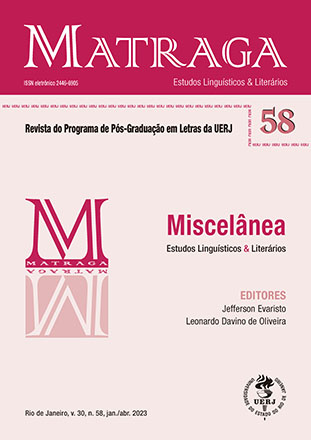Um estudo sobre a estruturação (macro e micro) e a caracterização de dicionários ideológicos
DOI:
https://doi.org/10.12957/matraga.2023.68306Palavras-chave:
Lexicografia, Onomasiologia, Dicionário ideológico.Resumo
Esta pesquisa buscou analisar os aspectos estruturais (macro e micro) e as características de um tipo específico de obra lexicográfica onomasiológica: o dicionário ideológico, e sua diferenciação com o do tipo analógico. Para isso, baseou-se nos pressupostos de Babini (2006) e Quemada (1967) sobre a definição e caracterização desses repertórios. As discussões partem do conceito geral de onomasiologia (BALDINGER, 1966), de projetos lexicográficos (HAENSCH, 1982; MARTÍNEZ SOUZA, 2009) até chegar ao objeto de estudo “dicionário ideológico”. Para a delimitação do dicionário ideológico, empregou-se a análise de dois exemplares em específico: o Thesaurus of the english words and phrases, de Peter Mark Roget, publicado no ano de 1852, e o Dicionário Analógico da Língua Portuguesa, ideias afins, thesaurus, de Azevedo (2010). Os resultados mostram que o dicionário brasileiro de Azevedo (2010) possui uma vinculação e similaridade muito forte com o seu antecessor, o Thesaurus, e que, embora aquele se denomine “analógico”, ao ver desta pesquisa, caracteriza-se muito mais como um repertório lexicográfico ideológico.
Downloads
Downloads
Publicado
Como Citar
Edição
Seção
Licença
AUTORIZAÇÃO
A Matraga – Revista do Programa de Pós-Graduação em Letras da UERJ está autorizada a publicar o artigo ora submetido, caso seja aceito para publicação online. Fica atestado que a contribuição é original, que não está sendo submetida a outro editor para publicação, e que a presente declaração é a expressão da verdade.
Os trabalhos publicados no espaço virtual da Matraga – Revista do Programa de Pós-Graduação em Letras da UERJ serão automaticamente cedidos, ficando os seus direitos autorais reservados à Matraga. Sua reprodução, total ou parcial, é condicionada à citação dos autores e dos dados da publicação.

A Matraga utiliza uma Licença Creative Commons - Atribuição-NãoComercial 4.0 Internacional.





